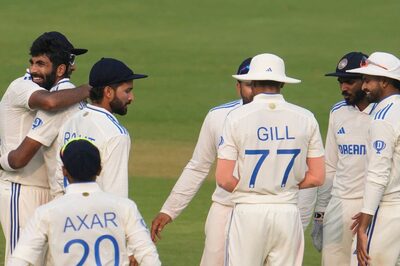
views
On October 7, Narendra Modi completed 20 years as the head of a government. For those of us in Gujarat, we have closely seen the rise of Narendra Modi and how he altered the trajectory of the state. People often ask what is the one thing that separates Modi. For me, it is the human touch, be it in work or personal interactions that has led to him scaling heights.
The 1980s were an interesting period in the politics of Gujarat. The Congress was comfortably ensconced in power, both at the Centre and in the state. Despite its lackluster governance, bitter factionalism and misplaced priorities, it was unimaginable that any other political party would come to power. Hardcore BJP supporters and workers were also uncertain.
ALSO READ | Lessons For All in PM Narendra Modi’s 20 Uninterrupted Years in Public Office
It was in such times that Modi made a shift from RSS to a more political life in the BJP. He took up the challenge of preparing the party for the Ahmedabad Municipal Corporation elections. One of his earliest steps was to integrate professionals with the BJP. The party machinery reached out to eminent doctors, lawyers, engineers and teachers to join the electoral and political process. Similarly, Modi attached great importance to talking about governance issues in addition to only politics. He was constantly thinking of innovative ways of uplifting people and transforming lives.
As a communicator, Modi was always outstanding and more than that he was motivating. I recall this one particular speech at a medium sized gathering at Nirmal Party Plot in Ahmedabad’s Dharnidhar. For the first few minutes, he made people laugh through the witty comments he was known for. He then went on to ask the crowd — shall we continue joking or shall we talk about issues of national importance? I do not know what courage I developed at that time that I shouted – Both. On hearing me say that he turned to me and said – No, we cannot do both. He then talked at length about BJP’s governance vision, Article 370, the Shah Bano Case and more. The ideological clarity left me spellbound.
Those outside Gujarat would not know that Modi’s cassettes of speeches were very popular in urban Gujarat during early 1990s. These cassettes would include parts of a speech Modi would have given in some part of the state.
One more of his moving speeches came in 1994 just after the Latur earthquake. From the RSS Karyalaya in Ahmedabad, relief material and a few volunteers were sent to Latur. Modi gave an impromptu speech. After the speech, at least 50 people said they want to leave for Latur right away and that Modi’s words have had a great impact on their mind. He dissuaded them and said it is more important relief work reaches than people going, and that they must keep working for the nation where they are.
Narendra Modi’s connect with different sections was also linked to his ability to reach out to different sections of society. The world saw his ‘Chai Pe Charcha’ in 2013-2014 but I cannot forget how Modi forged a bond with different people over cups of tea by interacting with morning walkers. During the 1990s, I met him at Ahmedabad’s famous Parimal Garden where he was addressing a group of morning walkers. I could instantly see the connect. One of the doctors who knew me told me that similar interactions with Narendra Bhai were very helpful for him to understand current affairs.
There are two anecdotes, which to me show the humane side of Narendra Modi. One of them dates back to the early 2000s. Historian Rizvan Kadri and I were documenting some of the works of KeKa Shastri, a doyen of Gujarati literature and veteran of the Sangh eco-system. We had gone to meet him and one thing that struck me was his poor health. I took a photograph and got it sent to Narendra Modi’s office. At soonest, KeKa Shastri had a nurse who would attend to him.
The other relates to author Priyakant Parikh. He had a strong desire that his 100th work be launched only by Modi but the only glitch — he is immobile and homebound due to a major accident. I remember CM Modi going to Priyakant Parikh’s house at Ashram Road and launching his book. Gujarati literature circles were spellbound that a sitting CM would go to the drawing room of an ailing author and launch his book!
Two virtues that have stood him well, which would serve every political person well are – his sharp listening skills and his love for technology. His only regret about technology — that the art of remembering phone numbers was going!
ALSO READ | Modi Model: 20 Years of Efficient and Effective Governance
Through his political career, party disciple has been paramount for Narendra Modi. Ambition is not known to him. No wonder the BJP has never lost a single election – be it Lok Sabha, Vidhan Sabha or local body, when Narendra Modi was given the task of coordinating the party strategy. The only time the BJP saw electoral setback was in the year 2000 and that was when Narendra Modi was outside the state.
As journalists, we have to meet several people but Narendra Modi told me when I was a young reporter that these must not be transactional relations but bonds that last a lifetime. Sometime around Holi in 1998 I happened to be in Delhi. Narendra Modi said something I will never forget. He said, “You must have 5,000 numbers in your telephone diary and you must have met them once and that too not in a formal way. You must know them just not as a source but as an acquaintance or friend.” I have not met 5,000 people as Narendra Modi asked me to but it did make me realise the importance of a human touch that is so important. Narendra Modi has it in plenty, which is why he is so successful.
The writer is a journalist based in Ahmedabad. The views expressed in this article are those of the author and do not represent the stand of this publication.
Read all the Latest News , Breaking News and IPL 2022 Live Updates here.


















Comments
0 comment